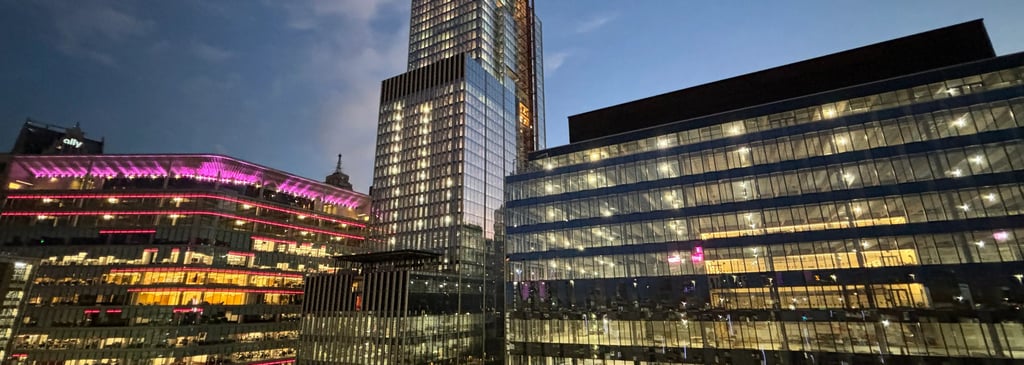Hudson's Detroit Skyscraper Nears Completion: A New Chapter for the Motor City
The Hudson's Detroit skyscraper is set to redefine Detroit's skyline. As the city's tallest building in decades, this $1.4 billion project blends historic significance with modern design, promising to be a catalyst for downtown revitalization.
8/14/20253 min read
Detroit's skyline is on the verge of a monumental transformation with the nearing completion of the Hudson's Detroit skyscraper. Standing at 685 feet, this 49-story tower is poised to become the tallest building in Michigan, surpassing even the iconic Renaissance Center. Located at 1208 Woodward Avenue, the Hudson's Detroit development is a $1.4 billion project that honors the city's rich history while embracing its future.
This skyscraper represents a tangible sign of Detroit's resurgence. For decades, the city has experienced cycles of economic decline and revitalization, and the Hudson's Detroit tower is a visible statement that Detroit is moving forward. From its height to its cutting-edge design, the building promises to become a defining feature of the city’s skyline for generations.
A Legacy Reimagined
The site of Hudson's Detroit holds deep historical roots. It was once home to the J.L. Hudson Department Store, a retail giant that dominated Detroit's retail scene for much of the 20th century. The original store, opened in 1911, was the tallest department store in the world at the time. Its towering presence symbolized Detroit’s industrial and economic might during that era.
After the store’s demolition in 1998, the site remained vacant for years, representing both the challenges and the potential for Detroit’s urban core. The new skyscraper turns this historic site into a modern urban landmark, blending architectural innovation with the city’s rich heritage. It symbolizes Detroit’s ability to honor its past while embracing growth and modernity.
Architectural Marvel
Designed by SHoP Architects in collaboration with Hamilton Anderson Associates, Hudson's Detroit is a testament to modern architectural excellence. The skyscraper features a sleek glass façade composed of thousands of panels, each weighing up to 2,200 pounds. Its reflective surface captures the vibrancy of the surrounding city, allowing the building to visually integrate with Detroit’s historic streetscape.
The tower’s 49 floors will house a dynamic mix of office spaces, luxury residences, and retail establishments. This combination creates an environment that encourages both business activity and urban living. By blending work, leisure, and retail, the skyscraper contributes to a 24-hour downtown culture, which has long been a goal of urban planners and community leaders in Detroit.
Economic Impact
Hudson's Detroit is more than just a landmark; it is a major economic driver for the city. The project has created thousands of jobs during construction, ranging from skilled trades to engineering and design roles. Once complete, the building will continue to generate employment opportunities, particularly in professional services, retail, and hospitality.
Key tenants include major corporations relocating or expanding into the building, which signals confidence in Detroit’s economic potential. The presence of high-profile businesses will likely attract complementary enterprises to the surrounding area, amplifying the positive economic ripple effect throughout downtown Detroit. Local suppliers and contractors have also benefited from contracts associated with the project, further strengthening the regional economy.
Community and Cultural Significance
Beyond its economic impact, Hudson's Detroit plays an important role in the city’s cultural revival. The development includes public spaces designed to encourage community engagement. Open plazas, art installations, and performance areas create a cultural hub where residents and visitors can gather, socialize, and participate in events.
The project also highlights Detroit’s dedication to celebrating local art and history. By integrating cultural elements into the development, Hudson's Detroit serves as more than a workplace or residential space—it becomes a focal point for urban life and creative expression. This community-oriented approach aligns with broader efforts to revitalize Detroit’s downtown and enhance the city’s identity.
Environmental Considerations
Hudson's Detroit also sets a benchmark for sustainability. The skyscraper incorporates energy-efficient systems and environmentally conscious materials throughout its design. Features include green roofs, advanced heating and cooling systems, and water conservation technologies.
These initiatives minimize the building’s carbon footprint and align with Detroit’s long-term sustainability goals. By combining modern architecture with eco-friendly design, Hudson's Detroit demonstrates that large-scale urban development can be both ambitious and responsible. Residents and tenants can enjoy high-quality spaces without compromising environmental stewardship.
Looking Ahead
As Hudson's Detroit nears completion, it symbolizes more than just a new building—it represents a renewed spirit for the city. The tower showcases Detroit’s capacity for urban transformation and innovation, blending historical reverence with modern functionality.
Future generations will likely see Hudson's Detroit not only as an architectural marvel but also as a milestone in Detroit’s journey of recovery and growth. Its impact on business, culture, and sustainability sets a precedent for future developments across the city and serves as inspiration for other post-industrial urban centers seeking revitalization.
Conclusion
The nearing completion of the Hudson's Detroit skyscraper marks a significant milestone in the city’s evolution. This iconic structure redefines Detroit’s skyline, promotes economic growth, fosters community engagement, and champions environmental responsibility. By combining the city’s historic legacy with modern design and functionality, Hudson's Detroit stands as a symbol of optimism and resilience for Detroit’s residents and visitors alike.
The building’s influence extends beyond its physical presence; it contributes to a renewed identity for the city, demonstrating that Detroit is poised to thrive in the modern era. Hudson's Detroit is more than a skyscraper—it is a testament to the city’s past, present, and future.


